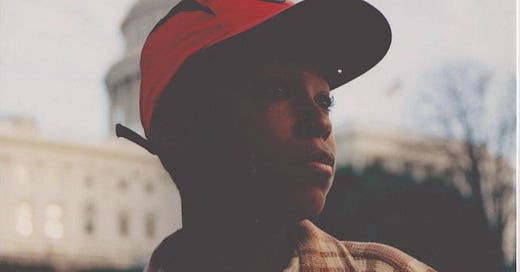Heartland: 17 Blocks

For tickets and showtimes or other information about Heartland Film Festival, please click here.
Last year I criticized the much-overpraised "Roma" as being little more than the director's haphazardly-assembled home movies. That description was used as the insult it was intended.
I will say the same thing about the documentary "17 Blocks," but in this case it is high praise.
This astonishing and deeply emotional documentary is the story of the Sanford family, a close-knit African-American clan in Washington D.C. The title refers to the vibrant but downtrodden neighborhood in which they occasionally move from home to home, but never really leave.
In 1999 the Sanfords got a video camera and started recording their lives for posterity. Laughter, arguments, joy, tragedy, shame, pride -- it's all there in moving pictures.
Now, 20 years and thousands of hours of footage later, director Davy Rothbart ("Medora") and his team has taken those home movies and assembled them into something revelatory. Like the watershed "Hoop Dreams," it is an intimate portrait of real people at the bottom of the socioeconomic ladder. Inner-city dwellers challenged daily by the specters crime and racism rarely find their stories told.
The tale largely centers around two brothers, Emmanuel and Smurf, who are almost biblical in their dichotomy. Emmanuel is quiet, hard-working, a homebody. It is he who largely operates the camera in the early going as a 9-year-old. Later he grows into young a man who dreams of becoming a firefighter. He works, enrolls in college, has a girlfriend -- the impossibly cute and smiley Carmen -- and seems headed for a good life.
But in 2009, at age 19, Emmanuel is gunned down during a robbery inside the family home. Smurf, sullen and already a veteran in the street drug trade, lies down and hands over the money. Emmanuel fights to protect his family and is killed.
His blood spatters their hallway like a stain on their souls -- one that will not be washed away so easily.
In one heartrending scene, they go to a store to have an image of Emmanuel put on shirts they can wear to remember. In this part of D.C., murders happen so often that RIP apparel has become quite the cottage industry.
The mother, Cheryl, has been hooked on drugs her entire adult life. She blames herself for what happened to her two boys. Now in her 60s, she is a living cautionary tale with hollow eyes and flesh seemingly eaten away by addiction. But she harbors a glimmer of hard-pressed hope.
Smurf, entering his 30s, has been arrested once again and is facing hard time in prison and separation from his own two sons. He also feels guilty about what happened to Emmanuel, and wonders if he brought that life into their home. Now he is working in a deli slicing meat all day, and is thankful for it while awaiting sentencing.
"When you're uncomfortable and you want to be comfortable, you make bad decisions," Smurf says.
Sister Denise works and works, acting as the anchor the rest of the family takes for granted. At one point we see her training with a gun, and are shocked. How could she embrace the means of her brother's demise? But she sees the weapon as merely a tool to a better life, in which she aspires to be a law enforcement officer. She has taken up her brother's shield.
Life goes on. Children are born and start to grow up; Cheryl is now the grandmother but still falling into the same old traps. Carmen still comes around, and feels like Cheryl's grandkids, Justin and Faith, are the children she and Emmanuel would have had.
Someone comments that Justin, at age 9, is the spitting image of his uncle Emmanuel. "Does that mean I got 11 more years until I die?" he asks innocently.
The Sanfords are the sort of people used to being looked down upon. But theirs is the quintessential American story. No matter how much they are put down, they find a way to rise.
"17 Blocks" is an unfiltered and focused gaze into one family, and our nation's heart.



